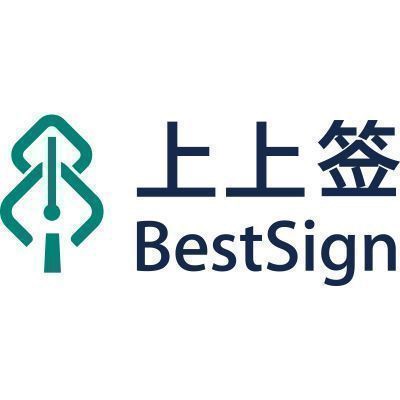DocuSign, the world's largest electronic signature platform, went public on Nasdaq in April 2018, and at its peak, had a valuation of US$10 billion. The company’s services are available in 43 languages and used in 188 countries around the world. China is not one of them.
This market gap offers a unique opportunity for Chinese e-contracting companies. Shangshangqian, a third-party e-signature platform, is currently capable of handling over 11 million online contracts daily and has more than 500,000 corporate clients.
Five years back, its founder Wan Min, who, at the time, was working at Apple, had concluded that, because more firms are operating their business online, reliable e-contracting is needed more than ever. Inspired by the success of DocuSign, she founded Shangshangqian.
“Many businesses have spotted the need and want a share of the [e-contract] market. For all players on the stage, the tricky part is security,” said Wan, who is also CEO of the startup.
Security, security, security
In April 2005, China recognized the legal validity of e-contracts by implementing the Electronic Signature Law, which regulates the creation and usage of e-signatures. But this new form of contract has not been well received by many businesses and individuals.
Despite the law, many parties have still been taken to court for accusations related to e-contracts, such as revising terms after the fact and questioning the legality of e-signatures.
To avoid protracted court battles, many companies continue to use paper documentation. Parties to a contract are willing to travel long distances to get a document signed, rather than resorting to e-contracts.
Once a contract is signed via Shangshangqian, it is automatically encrypted and stored in a public or private cloud as per the request of the client, making it technologically impossible for anyone, even employees of Shangshangqian, to alter the contract.
In 2016, Shangshangqian received the certificate for level-3 cyber security protection, the highest cybersecurity level for non-bank institutions, from China's Ministry of Public Security. It is also the world’s first and only e-signature solutions provider certified ISO/IEC 27018 compliant.
In addition, Shangshangqian, like other Chinese e-contracting firms, is now further augmenting its cybersecurity by offering a blockchain-based e-signing service because of the immutable and unhackable nature of the technology.
Matthew Effect
Shangshangqian emphasizes convenience to clients: its SaaS offerings are accessible via its website, app and API. The e-signature platform can even be embedded into a client’s own OA system. Clients can log onto the back-end system to oversee the whole process of e-contracting and approve or revoke contracts in bulk.
Secondhand car trading platform Souche.com is one of its clients. “Our customers, the majority of whom are internet users, can now sign their purchase contracts with just a click. The whole process takes less than one minute,” said Shen Gan, senior vice president of Souche.com.
Because Shangshangqian’s scalable servers can handle up to 4,000 e-contracts a second, Souche.com’s system was able to sell 25,761 cars during the 24-hour online shopping spree on November 11, 2018.
The quality of the e-contracting startup’s services has brought in many big name clients, including Bank of Communications, China Construction Bank, Lenovo, Volvo, Yonghui Superstores and Zhihu. In turn, these clients have brought in other clients. “There is a Matthew Effect here,” Wan said.
According to Wan, referrals from existing clients are Shangshangqian’s primary means of acquiring new users.
In 2018, the startup reported a Net Promoter Score (NPS) of 72%, meaning 72 out of every 100 clients would recommend Shangshangqian to others. “[Our NPS score] is the highest in China’s e-signature sector,” said Wan.
A step ahead
China’s e-contracting market, projected to reach RMB 100 billion by 2021, is currently led by Shangshangqian, Fadada and Eqianbao, which have respectively cornered 33.6%, 15.8% and 6.6% of the market. But it still has significant untapped potential. Consulting firm iiMedia Research estimated that the penetration rate is only 1% in China.
And Shangshangqian is in pursuit of that remaining 99%. In October 2018, the startup announced a partnership with Oracle NetSuite, which provides business operation and management solutions to more than 430,000 clients across 175 countries, including China. “The new partnership will introduce us to more potential users,” said Wan.
Meanwhile, Shangshangqian is expanding its services overseas, a move domestic rivals have not yet attempted. In March 2019, it reached a partnership with the Russian Bank for Foreign Trade, the country’s second biggest bank, which will now use Shangshangqian’s SaaS service in its financial dealings. It remains to be seen whether this Chinese upstart can break DocuSign’s hold on the international market.














